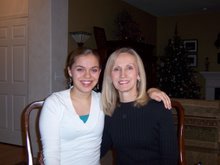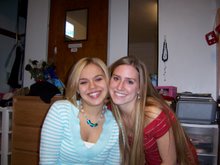Little People, Big World, on TLC, easily exposed me to things the I
 do not experience in my own reality. This show is all about the Roloff family — an extraordinary family composed of both little and average-sized people. The family starts with the parents, who are both little people, they are diagnosed with dwarfism. They have four children all of whom are average size except for one. It was quite interesting to see how the family interacted with one another as well as with others. TLC follows the family around and you get to see what they do everyday. The Roloff’s live on a farm. By watching how hard the ‘little’ people worked to make their farm successful as well as raise their children, I learned a lot about their lifestyle. I have never lived on a farm or met a ‘little’ person, so this experience is something that I would have only seen on TV.
do not experience in my own reality. This show is all about the Roloff family — an extraordinary family composed of both little and average-sized people. The family starts with the parents, who are both little people, they are diagnosed with dwarfism. They have four children all of whom are average size except for one. It was quite interesting to see how the family interacted with one another as well as with others. TLC follows the family around and you get to see what they do everyday. The Roloff’s live on a farm. By watching how hard the ‘little’ people worked to make their farm successful as well as raise their children, I learned a lot about their lifestyle. I have never lived on a farm or met a ‘little’ person, so this experience is something that I would have only seen on TV.On Dancing With The Stars I ran into a cast of people who I normally wouldn’t “know” since most reality shows lead you to believe that you “know” these characters in some way. Most had
 achieved some sort of fame all the way from a former Miss USA, an undefeated female world boxing champion, to a former USA Dream Team Ball Player. Now I normally don’t watch this show nor do I normally go ballroom dancing with my friends, but I enjoyed the show. I am involved with dance and love dancing so this show really appealed to me. During our weekly Dance Theatre Tech classes we’ve even had a few lessons on ballroom dancing so watching it made me want to take some more lessons.
achieved some sort of fame all the way from a former Miss USA, an undefeated female world boxing champion, to a former USA Dream Team Ball Player. Now I normally don’t watch this show nor do I normally go ballroom dancing with my friends, but I enjoyed the show. I am involved with dance and love dancing so this show really appealed to me. During our weekly Dance Theatre Tech classes we’ve even had a few lessons on ballroom dancing so watching it made me want to take some more lessons.Now, I faithfully watched The Bachelor a few seasons ago during my freshman year of college. N
 o matter how much I knew that the reality of something like this ever happening, I still enjoyed watching. I tuned in each week to watch the women fight over this man they claimed to love, that they’d only known for um about three weeks. Not to be a Debbie Downer, but how can you claim to love a man you barely know, especially when there’s hordes of other women trying to get to know him as well. Anyways, I watched the show and although I disagree with the point, I have to admit that I enjoyed watching the drama. This show defies reality as I know it. Now the fact that all of these people are searching for their true love, I can relate too. All the drama and one guy dating 16 women—not a reality that I know. The only other place I think you might find as much drama between women is either on a cheerleading squad or on a sorority suite.
o matter how much I knew that the reality of something like this ever happening, I still enjoyed watching. I tuned in each week to watch the women fight over this man they claimed to love, that they’d only known for um about three weeks. Not to be a Debbie Downer, but how can you claim to love a man you barely know, especially when there’s hordes of other women trying to get to know him as well. Anyways, I watched the show and although I disagree with the point, I have to admit that I enjoyed watching the drama. This show defies reality as I know it. Now the fact that all of these people are searching for their true love, I can relate too. All the drama and one guy dating 16 women—not a reality that I know. The only other place I think you might find as much drama between women is either on a cheerleading squad or on a sorority suite.After briefly talking about Meyrowitz and Baudrillard in our mass communications class, I began to see how some of their arguments make sense. Meyrowitz argues “that the very existence of television is an influence on society because it breaks down the physical barriers that separate people (Hanson, 2005, pg. 256).” For example, in Little People, Big World, I experienced life firsthand through the Roloff family. I learned what it entailed to run a farm and I also learned some of the challenges and obstacles that little people overcome everyday to live a normal life. Because of the ‘physical barriers’ in my life I never would have experienced this. TV broke down these barriers and showed me what someone else’s life is like. This influenced me so that now if I ever meet or know a little person or even someone who lives on and runs a farm I know a little bit about them, therefore influencing society. Although the barriers are being broken, the barriers are broken are through the media, which is controlled by the gatekeepers. In a sense then the gatekeepers decide what barriers are broken and what we see.
Baudrillard argues that we can no longer distinguish between fantasy and reality, especially in
 television. I have to go both ways on this. I can see where Baudrillard’s argument rings true. In most TV shows, the distinction between fantasy and reality is very thin. Especially to most of the people who are on the shows (The Bachelor). Another example: Grey’s Anatomy. I watch this show faithfully (even though it was not included in my prime time viewing from above) and the show seems very real. The viewer needs to take a step back and realize that although the ABC producers do a great job of making the show seem real, making these people seem like real surgeons, they are not. If you do not understand that, then I feel you are in danger. I also feel that I can argue against Baudrillard’s theory as well. In the Bachelor, at least for me, it is very clear to me that this in fact is not reality. Twenty five women all competing for a man, to fall in love with him, and marry him. Honestly how long do they think that marriage will last??
television. I have to go both ways on this. I can see where Baudrillard’s argument rings true. In most TV shows, the distinction between fantasy and reality is very thin. Especially to most of the people who are on the shows (The Bachelor). Another example: Grey’s Anatomy. I watch this show faithfully (even though it was not included in my prime time viewing from above) and the show seems very real. The viewer needs to take a step back and realize that although the ABC producers do a great job of making the show seem real, making these people seem like real surgeons, they are not. If you do not understand that, then I feel you are in danger. I also feel that I can argue against Baudrillard’s theory as well. In the Bachelor, at least for me, it is very clear to me that this in fact is not reality. Twenty five women all competing for a man, to fall in love with him, and marry him. Honestly how long do they think that marriage will last??I feel that if a person has a good balance in their TV viewing they will be just fine. A person can learn a lot from TV by having their physical barriers broken down and experiencing something new (Meyrowitz). This person needs to take Baudrillard’s argument into consideration though. It is ok to learn something or experience something new from the television you watch, you just have to be smart about what you consider to be real.


No comments:
Post a Comment